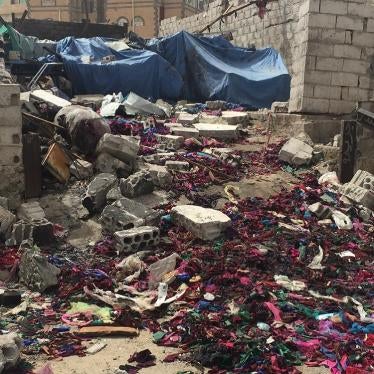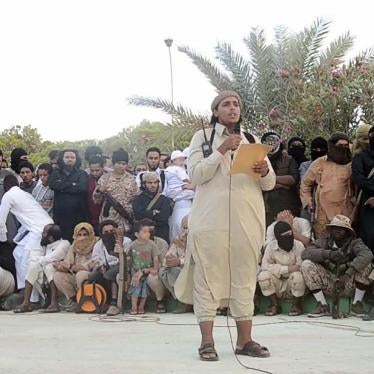The latest reports of targeted US attacks on militant leaders abroad – one in Libya and one in Yemen —once again raise the issue of the secrecy around these attacks, especially the drone attacks under CIA jurisdiction.
But Congress may be poised to address the issue. A media report on June 10 said the Senate Armed Services Committee is working on a classified annex to the annual defense authorization bill to make it easier for the president to keep his promise to transfer authority for targeted killings from the CIA to the Pentagon.
Just days earlier, family members of victims of a drone strike in Yemen filed suit in U.S. federal court, contending that their relatives’ deaths – unacknowledged by the US – were unlawful. This burst of activity punctuated the relative quiet in Washington.
A Defense Department spokesman quickly acknowledged the attack by fighter jets on June 14 aimed at Mokhtar Belmokhtar. US officials said on Monday that they couldn’t confirm the Yemen attack, reported to have killed Nasser al-Wuhayshi the previous week. And the U.S. has never officially acknowledged the Yemen drone attack that killed the men whose relatives filed suit.
Human Rights Watch and other human rights groups have long urged the administration to transfer authority for targeted killings from the CIA to the Defense Department, in part because the Defense Department is more transparent about its operations than the covert CIA.
For a brief moment in April, drones were a hot topic when news broke that an American, Dr. Warren Weinstein, and an Italian, Giovanni Lo Porto, humanitarian aid workers who were being held hostage by Al-Qaeda in Pakistan, had been killed by a U.S. drone strike in January. Shortly after the story broke, President Obama took to the airwaves to formally acknowledge and express regrets for their deaths. But it was widely suspected that the public acknowledgement and promise for a “full investigation” came only because the victims were Westerners.
Obama’s revelations once again prompted myriad questions about the legality of US counter-terrorism operations, the accuracy of intelligence used for drone strikes, the near complete secrecy surrounding them, and the consequences of the program both for US reputation and security. These issues have been raised for years both inside and outside the national security establishment, and by human rights groups, and representatives of victims abroad.
Obama himself raised some of them in a May 2013 speech in which he said that US drone policy calls for “near-certainty” that no civilians will be harmed and that the target poses an “imminent threat.” Since then it has been less clear whether Obama was pronouncing policy or a wish list – details of individual strikes show evident disregard for the criteria, and according to media reports, Obama secretly carved out an exception for Pakistan for at least some of the rules.
The government’s refusal to acknowledge whom it is killing, and why, deprives the public of the right to freely debate important policy issues and the victims of unlawful strikes any real acknowledgment of the harm they suffered. Although the U.S. has conducted hundreds of drone strikes in Pakistan and Yemen, the only strikes it has formally acknowledged are those that have killed, deliberately or not, U.S. citizens. In large part this is because of the role the CIA plays in the program.
In Pakistan, a purported secret agreement reportedly requires the U.S. to deny any role in drone strikes. In his April statement, Obama referred only to “a U.S. counterterrorism operation targeting an Al-Qaeda compound in the Afghanistan-Pakistan border region.” A transfer of drone strike authority from the CIA to the Pentagon would not mean the end of unlawful killings. U.S. drone strikes in Yemen targeting Al-Qaida in the Arabian Peninsula (AQAP) have killed dozens of civilians. The Defense Department has conducted some of the strikes and the now-exiled president of Yemen claimed to have approved them, but the U.S. still won’t even acknowledge those operations, let alone apologize for wrongful civilian deaths. Such practices have generated hostility toward the U.S. from people also opposed to AQAP atrocities.
Instead, on occasion the U.S. reportedly has provided secret “condolence” payments to victims of strikes that drew media attention, such as the one on a wedding convoy that killed 12 people and wounded 15 others in December 2013.
The January strike that killed Weinstein and Lo Porto was an illustrative reminder that intelligence capabilities will never eliminate the risk to civilian lives. That means mechanisms need to be in place to ensure that civilian loss is counted, brought to light, and appropriately acted on.
Some of these problems can be addressed by the greater transparency that would be available if the U.S. military assumes responsibility for all the strikes. Senator John McCain (R-Ariz.), chair of the Senate Armed Service Committee, has said publicly he supports the transfer. Whether by the classified annex to the defense spending bill or through other, hopefully more transparent, means, a shift of authority to the military would present a tremendous opportunity for McCain and members of his committee, who would have oversight over the program. The armed services committees – unlike the intelligence committees that oversee the CIA – conduct oversight in a largely unclassified setting.
Whether the transfer happens or not, public acknowledgment of strikes, investigations into allegations of civilian harm, and compensation where appropriate should, be an integral and consistent part of any policy that includes lethal action. The Obama administration has appropriately taken these steps for the families of Weinstein and Lo Porto. Don’t the families of other civilians killed deserve the same?
Andrea Prasow is deputy Washington director at Human Rights Watch.







